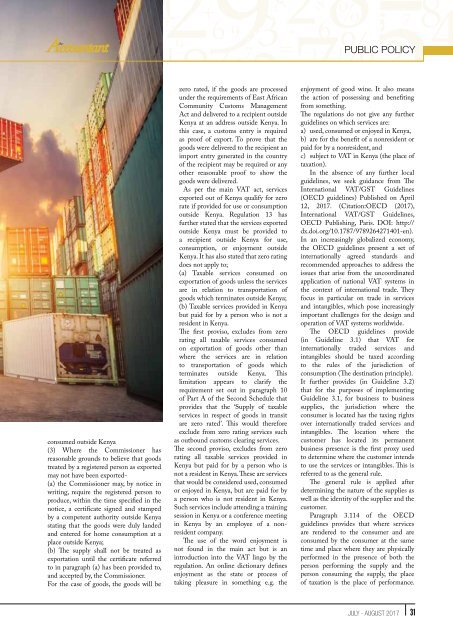The-Accountant-Jul-Aug-2017
You also want an ePaper? Increase the reach of your titles
YUMPU automatically turns print PDFs into web optimized ePapers that Google loves.
Public Policy<br />
consumed outside Kenya<br />
(3) Where the Commissioner has<br />
reasonable grounds to believe that goods<br />
treated by a registered person as exported<br />
may not have been exported-<br />
(a) the Commissioner may, by notice in<br />
writing, require the registered person to<br />
produce, within the time specified in the<br />
notice, a certificate signed and stamped<br />
by a competent authority outside Kenya<br />
stating that the goods were duly landed<br />
and entered for home consumption at a<br />
place outside Kenya;<br />
(b) <strong>The</strong> supply shall not be treated as<br />
exportation until the certificate referred<br />
to in paragraph (a) has been provided to,<br />
and accepted by, the Commissioner.<br />
For the case of goods, the goods will be<br />
zero rated, if the goods are processed<br />
under the requirements of East African<br />
Community Customs Management<br />
Act and delivered to a recipient outside<br />
Kenya at an address outside Kenya. In<br />
this case, a customs entry is required<br />
as proof of export. To prove that the<br />
goods were delivered to the recipient an<br />
import entry generated in the country<br />
of the recipient may be required or any<br />
other reasonable proof to show the<br />
goods were delivered.<br />
As per the main VAT act, services<br />
exported out of Kenya qualify for zero<br />
rate if provided for use or consumption<br />
outside Kenya. Regulation 13 has<br />
further stated that the services exported<br />
outside Kenya must be provided to<br />
a recipient outside Kenya for use,<br />
consumption, or enjoyment outside<br />
Kenya. It has also stated that zero rating<br />
does not apply to;<br />
(a) Taxable services consumed on<br />
exportation of goods unless the services<br />
are in relation to transportation of<br />
goods which terminates outside Kenya;<br />
(b) Taxable services provided in Kenya<br />
but paid for by a person who is not a<br />
resident in Kenya.<br />
<strong>The</strong> first proviso, excludes from zero<br />
rating all taxable services consumed<br />
on exportation of goods other than<br />
where the services are in relation<br />
to transportation of goods which<br />
terminates outside Kenya. This<br />
limitation appears to clarify the<br />
requirement set out in paragraph 10<br />
of Part A of the Second Schedule that<br />
provides that the ‘Supply of taxable<br />
services in respect of goods in transit<br />
are zero rated’. This would therefore<br />
exclude from zero rating services such<br />
as outbound customs clearing services.<br />
<strong>The</strong> second proviso, excludes from zero<br />
rating all taxable services provided in<br />
Kenya but paid for by a person who is<br />
not a resident in Kenya. <strong>The</strong>se are services<br />
that would be considered used, consumed<br />
or enjoyed in Kenya, but are paid for by<br />
a person who is not resident in Kenya.<br />
Such services include attending a training<br />
session in Kenya or a conference meeting<br />
in Kenya by an employee of a nonresident<br />
company.<br />
<strong>The</strong> use of the word enjoyment is<br />
not found in the main act but is an<br />
introduction into the VAT lingo by the<br />
regulation. An online dictionary defines<br />
enjoyment as the state or process of<br />
taking pleasure in something e.g. the<br />
enjoyment of good wine. It also means<br />
the action of possessing and benefiting<br />
from something.<br />
<strong>The</strong> regulations do not give any further<br />
guidelines on which services are:<br />
a) used, consumed or enjoyed in Kenya,<br />
b) are for the benefit of a nonresident or<br />
paid for by a nonresident, and<br />
c) subject to VAT in Kenya (the place of<br />
taxation).<br />
In the absence of any further local<br />
guidelines, we seek guidance from <strong>The</strong><br />
International VAT/GST Guidelines<br />
(OECD guidelines) Published on April<br />
12, <strong>2017</strong>. (Citation:OECD (<strong>2017</strong>),<br />
International VAT/GST Guidelines,<br />
OECD Publishing, Paris. DOI: http://<br />
dx.doi.org/10.1787/9789264271401-en).<br />
In an increasingly globalized economy,<br />
the OECD guidelines present a set of<br />
internationally agreed standards and<br />
recommended approaches to address the<br />
issues that arise from the uncoordinated<br />
application of national VAT systems in<br />
the context of international trade. <strong>The</strong>y<br />
focus in particular on trade in services<br />
and intangibles, which pose increasingly<br />
important challenges for the design and<br />
operation of VAT systems worldwide.<br />
<strong>The</strong> OECD guidelines provide<br />
(in Guideline 3.1) that VAT for<br />
internationally traded services and<br />
intangibles should be taxed according<br />
to the rules of the jurisdiction of<br />
consumption (<strong>The</strong> destination principle).<br />
It further provides (in Guideline 3.2)<br />
that for the purposes of implementing<br />
Guideline 3.1, for business to business<br />
supplies, the jurisdiction where the<br />
consumer is located has the taxing rights<br />
over internationally traded services and<br />
intangibles. <strong>The</strong> location where the<br />
customer has located its permanent<br />
business presence is the first proxy used<br />
to determine where the customer intends<br />
to use the services or intangibles. This is<br />
referred to as the general rule.<br />
<strong>The</strong> general rule is applied after<br />
determining the nature of the supplies as<br />
well as the identity of the supplier and the<br />
customer.<br />
Paragraph 3.114 of the OECD<br />
guidelines provides that where services<br />
are rendered to the consumer and are<br />
consumed by the consumer at the same<br />
time and place where they are physically<br />
performed in the presence of both the<br />
person performing the supply and the<br />
person consuming the supply, the place<br />
of taxation is the place of performance.<br />
JULY - AUGUST <strong>2017</strong> 31

















